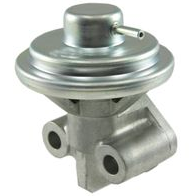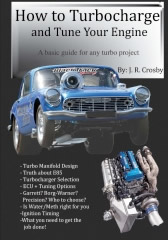| What's Hot! | Products/ Tools | EFI Tuning | Basic Tuning | Advanced Tuning | Chassis Tuning | Advertise with us |
Repairing an EGR valve

How an EGR valve works and how to fix / replace a stuck EGR valve
Contributed by: Enginebasics.com
Almost all cars and trucks today are equipped with an EGR valve so it only makes sense that we write an article that helps you understand what it is and how to fix or replace it when the time comes.
What is an EGR valve?
An Exhaust Gas Recirculation valve (EGR Valve) is a valve that allows some of the exhaust gases of the engine to be routed back into the intake and back through the motor. You’re probably thinking “why would you ever want to take exhaust gases and pump them back into the motor”? The reason is emissions. By taking some of the exhaust gases and having them pass through the motor twice it will further reduce the emissions associated with those gasses. The reason this is done using a valve is because carmakers don’t want this occurring all the time, but only in specific times when emissions are high. The EGR valve is used the most during initial start-ups. When you first start your vehicle the combustion of the engine is quit dirty. The fueling is super rich (extra fuel is delivered) to help fuel atomization when cold, the cylinder temperatures are low so your not getting a great burn, and the catalytic converters are cold so they are basically doing nothing. OEM manufacturers then came up with the idea of adding a valve that would circulate exhaust back through the motor at this time to help clean up some of the emissions.
How does an EGR valve work?
On most vehicles you will notice that the valve is electronically controlled. The cars computer (ECU) controls the valve and lets it know when to open and close or some amount in-between. Most of these valves are regulated based on the coolant temperature. When the vehicle is cold the valve is opened 100%. As the vehicle warms up and is brought up to temperature the valve proportionally is closed. This valve is usually located just off the exhaust manifold or intake manifold on a pipe that connects the two. Because of the extreme temperatures of exhaust gasses, hoses are not used for this connection. (click for larger image)
How to identify the EGR valve?
To identify the EGR valve on your engine look for a diaphragm that is around the size of a half-dollar to tennis ball size. Then look for a pipe that connects the exhaust manifold to the valve and back into the intake manifold. The EGR valve itself will have electrical wires running to it. Most EGR valves are either 2 or 3 wire valves. They take very low voltage to operate so these wires will be 16-18 gauge in size (that is a small wire for those that are not familiar with gauge sizes of electrical wire).
Can an EGR valve be repaired?
YES surprisingly. Many times the valve doesn’t need to be replaced, but instead just needs some TLC. Because the valves have exhaust gas running through them they build up a lot of carbon. A motor naturally builds up carbon inside of it that is washed away through the port injection of the gas and the combustion of the motor, but the EGR has neither of these. This causes tons of carbon to build up inside of the valve eventually causing it to become stuck and no longer function. Many have been able to pull the EGR valve off the motor and spray it with carb cleaner to get all the carbon build up out. They then reinstall the valve and find that it again works perfectly. This is a great thing to try before spending money on a new valve. (click for larger image)
Something to think about though before trying this method is how hard was it to get to the valve? Some cars the EGR valve is very easy to get to and this is a very simple 15 minute job. On other engines the EGR valve is buried under many hoses and electrical components and so it not worth trying to clean the valve, but instead makes more sense to just replace it.
Another thing to consider is cost. Some EGR valves are under $40 bucks, while others are ridiculously expensive. If the EGR valve starts climbing up in price be sure to first try the cleaning method.
Replacing the EGR valve
If you have deemed that the EGR valve needs complete replacement, than one of the things you need to make sure that you do at the same time is replace the gaskets. These gaskets are often either metal or paper based on the location of the valve and how hot it potentially can become. When the EGR valve is located close to the exhaust manifold it usually uses metal gaskets, while others located farther from the heat will use paper. If a paper gasket is used, be sure to apply a light coating of oil to the gasket so it will not dry out and crack and will make a good seal. A common problem is owners replace their EGR valves only to still have a check engine light that the valve is not working properly. Confused at the fact that they just changed the EGR valve what really is the problem is leaking gaskets. Take some care to not damage any of the gaskets on install.
Hopefully you found this article helpful and will be sure to check out the other articles we have here at enginebasics.com by clicking on the links found at the top and left side of the page. Be sure to like us on Facebook and follow us on twitter. If you have any questions, contact us.
ATTENTION READER:
If you enjoyed the information and article you just read be sure to check out our newly released book with even more exciting photo's and information:How to Turbocharge and Tune your Engine

Want to know more about your particular Make and Model vehicle? All of these vehicles are covered in the tech, maintenance and repair articles found above. Enginebasics is the wiki or wikipedia of car part, repair, how to and tuning information. Let us be the class 101 for your automotive learning.
| Ford | General Motors GM | Pontiac | Jaguar | Land Rover | Nissan |
| Toyota | Honda | Lexus | Acura | Lotus | Scion |
| Infinity | BMW | Mercedes | Mitsubishi | Ferrari | Maserati |
| Lamborghini | Volks Wagen VW | Saab | Audi | Hyundai | Kia |
| Subaru | Mazda | Chevy | Volvo | Caddilac | Dodge |
| Chrylser | Daewoo | Porsche | Mercury | Freightliner | MG |
Individual Models
| Ford Mustang | Mitsubishi Eclipse | Mitsubishi Evo | Subaru WRX / STI | Dodge Viper | Chevrolet Corvette |
| Nissan Skyline | Honda S2000 | Nissan 350z | Toyota Supra | Chevy Camaro | Lotus Elise Exige |
| Honda Civic | VW Golf | Dodge SRT-4 | Eagle Talon | Acura Integra | BMW M3 |
| Nissan 240sx | Porsche 911 | Acura NSX | Honda Accord | Toyota Camry | Toyota MR2 |
| VW R32 | Dodge Truck | Mazda Rx7 | VW Jetta | Sand Buggy | Nissan Sentra |
For the latest Automotive news and stories visit the websites below |
Our feature Build: An AWD V6 Civic






